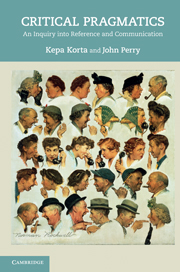Book contents
- Frontmatter
- Contents
- Preface
- Acknowledgments
- 1 Introduction
- 2 A short history of reference
- 3 Acts, roles, and singular reference
- 4 Elements of reference
- 5 Demonstratives
- 6 Context sensitivity and indexicals
- 7 Names
- 8 Definite descriptions
- 9 Implicit reference and unarticulated constituents
- 10 Locutionary content and speech acts
- 11 Reference and implicature
- 12 Semantics, pragmatics, and Critical Pragmatics
- 13 Harnessing information
- 14 Examples
- Bibliography
- Index
9 - Implicit reference and unarticulated constituents
Published online by Cambridge University Press: 05 March 2013
- Frontmatter
- Contents
- Preface
- Acknowledgments
- 1 Introduction
- 2 A short history of reference
- 3 Acts, roles, and singular reference
- 4 Elements of reference
- 5 Demonstratives
- 6 Context sensitivity and indexicals
- 7 Names
- 8 Definite descriptions
- 9 Implicit reference and unarticulated constituents
- 10 Locutionary content and speech acts
- 11 Reference and implicature
- 12 Semantics, pragmatics, and Critical Pragmatics
- 13 Harnessing information
- 14 Examples
- Bibliography
- Index
Summary
Introduction
Until now, we have been dealing with acts of reference in which the speaker uses an expression with a fairly complex intention to talk about some particular object. In our approach, the various referential devices are paradigmatically suited to exploit different types of cognitive fix the speaker may have on the object he intends to refer to. Demonstratives paradigmatically exploit perceptual buffers – e.g., ‘the object I'm seeing’ – indexicals exploit specific utterance relative fixes – ‘the speaker of the utterance’ – names exploit nominal fixes – involving a notion, and a network – and descriptions, when used referentially, can exploit any sort of epistemic or pragmatic role.
Now, we also hold that there are cases in which a speaker refers to an object without using any of these expressions or any expression at all. There are cases of implicit reference. We take implicit reference, or at least a central form of it, to involve a sort of mismatch between the referring expressions used in an utterance and the proposition that classifies its referential truth-conditions. Objects appear in the latter with no corresponding expression in the former. We call this phenomenon ‘unarticulated constituents.’
In this chapter we explain the idea of an unarticulated constituent and defend it from some objections to show how well it fits into the perspective of this book.
Unarticulated constituents and the supplemental nature of language
If we think of language as a species of action, it is natural to adopt the view that utterances are typically intended to add to or supplement a pre-existing situation, in some manner that will help complete the circumstances necessary to achieve some goal.
- Type
- Chapter
- Information
- Critical PragmaticsAn Inquiry into Reference and Communication, pp. 102 - 113Publisher: Cambridge University PressPrint publication year: 2011



